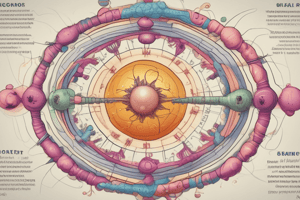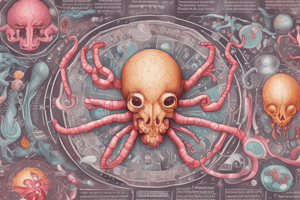Podcast
Questions and Answers
What is a malignant tumor?
What is a malignant tumor?
A malignant tumor is cancerous, meaning it grows uncontrollably and can spread to other parts of the body.
What is a benign tumor?
What is a benign tumor?
A benign tumor is non-cancerous and does not spread to other parts of the body.
What are the types of cancers?
What are the types of cancers?
- Melanoma (correct)
- Lymphoma (correct)
- Leukemia (correct)
- Sarcoma (correct)
- Carcinoma (correct)
What is the uncontrollable growth of abnormal cells called?
What is the uncontrollable growth of abnormal cells called?
Does having tumor cells in your body mean you will develop cancer?
Does having tumor cells in your body mean you will develop cancer?
What are some cognitive responses to cancer?
What are some cognitive responses to cancer?
What psychological approaches can help with cancer symptoms?
What psychological approaches can help with cancer symptoms?
What is one way to manage depression related to cancer?
What is one way to manage depression related to cancer?
What are some health behaviors to prevent illnesses?
What are some health behaviors to prevent illnesses?
What are two illnesses that can be prevented with a healthy lifestyle?
What are two illnesses that can be prevented with a healthy lifestyle?
What is the behavior change wheel?
What is the behavior change wheel?
What is doctor variability?
What is doctor variability?
What can affect possible treatments provided by health professionals?
What can affect possible treatments provided by health professionals?
What do patients want from health professionals?
What do patients want from health professionals?
What are two factors that influence the patient-doctor relationship?
What are two factors that influence the patient-doctor relationship?
Does social class affect the patient-doctor relationship?
Does social class affect the patient-doctor relationship?
What is an important aspect of communicating with patients?
What is an important aspect of communicating with patients?
What are some non-verbal cues patients notice from doctors?
What are some non-verbal cues patients notice from doctors?
What is medical jargon?
What is medical jargon?
What is adherence?
What is adherence?
Can psychological factors interfere with treatment adherence?
Can psychological factors interfere with treatment adherence?
What is depersonalization in the medical field?
What is depersonalization in the medical field?
What can result from a lack of communication between doctors and patients?
What can result from a lack of communication between doctors and patients?
What is the key to a successful doctor-patient relationship?
What is the key to a successful doctor-patient relationship?
Why does the health system need improvement?
Why does the health system need improvement?
What is one way doctors can improve communication?
What is one way doctors can improve communication?
Flashcards
Malignant tumor
Malignant tumor
A cancerous tumor that grows uncontrollably and can spread.
Benign tumor
Benign tumor
A non-cancerous tumor that does not spread.
Carcinoma
Carcinoma
Cancer of the skin or tissues lining organs.
Sarcoma
Sarcoma
Signup and view all the flashcards
Melanoma
Melanoma
Signup and view all the flashcards
Lymphoma
Lymphoma
Signup and view all the flashcards
Leukemia
Leukemia
Signup and view all the flashcards
Cancer
Cancer
Signup and view all the flashcards
Cognitive responses to cancer
Cognitive responses to cancer
Signup and view all the flashcards
Psychological approaches
Psychological approaches
Signup and view all the flashcards
Managing cancer-related depression
Managing cancer-related depression
Signup and view all the flashcards
Health behaviors (prevention)
Health behaviors (prevention)
Signup and view all the flashcards
Preventable illnesses
Preventable illnesses
Signup and view all the flashcards
Behavior change wheel
Behavior change wheel
Signup and view all the flashcards
Doctor variability
Doctor variability
Signup and view all the flashcards
Patient desires
Patient desires
Signup and view all the flashcards
Patient-doctor relationship factors
Patient-doctor relationship factors
Signup and view all the flashcards
Communication in healthcare
Communication in healthcare
Signup and view all the flashcards
Nonverbal cues
Nonverbal cues
Signup and view all the flashcards
Medical Jargon
Medical Jargon
Signup and view all the flashcards
Adherence
Adherence
Signup and view all the flashcards
Non-adherence
Non-adherence
Signup and view all the flashcards
Depersonalization
Depersonalization
Signup and view all the flashcards
Health system improvement
Health system improvement
Signup and view all the flashcards
Study Notes
Tumors and Cancer
- Malignant tumor: Cancerous, uncontrolled growth, spreads to other body parts.
- Benign tumor: Non-cancerous, does not spread.
- Cancer types: Carcinoma (skin/organ linings), sarcoma (connective tissues like bone/muscle), melanoma (skin cancer), lymphoma (lymphatic system), leukemia (blood-forming tissues).
- Cancer: Uncontrolled growth of abnormal cells.
- Tumor cells and cancer development: Having tumor cells doesn't guarantee cancer development.
Psychological Responses and Treatments
- Cognitive responses to cancer: Fatalism, helplessness, depression.
- Psychological approaches for cancer symptoms: Positive thinking, relaxation techniques (meditation), social support, pain management, body image therapy (e.g., after mastectomy).
- Managing cancer-related depression: Envisioning positive future events.
Health Behaviors and Prevention
- Healthy behaviors for illness prevention: Regular exercise, healthy diet, adequate sleep, safe driving habits.
- Preventable illnesses: Heart disease, diabetes.
Patient-Doctor Relationship
- Behavior change wheel: Framework for health interventions focusing on patient-centered practices, communication, and patient involvement in treatment.
- Doctor variability: Differences in diagnoses and treatment plans between different doctors.
- Factors influencing treatment options: Problem cause, severity, treatability.
- Patient desires: Competence, communication, and kindness from health professionals.
- Factors affecting doctor-patient relationship: Gender, expertise, social class (sometimes).
- Effective communication: Clear, structured communication, attention to verbal and nonverbal cues.
- Nonverbal cues: Appearing hurried, acting dismissive, displaying frustration.
Medical Adherence and Communication
- Medical jargon: Technical terms used by doctors that patients might not understand.
- Adherence: Following prescribed treatment plans, including medications and therapies.
- Non-adherence: Deliberately stopping or skipping medications or therapies.
- Psychological factors affecting adherence: Depression, feelings of sabotage.
- Depersonalization: Treating patients as numbers, hindering effective treatment.
- Communication breakdown: Potential issues like anxiety, confusion, and depression in patients.
- Effective doctor-patient relationship: Open communication, patient comfort in sharing concerns, empathetic doctor responses.
- Health system improvement: Enhanced communication, patient-centered care, psychological training for doctors.
- Improving communication: Responding to patient inquiries within 24 hours or offering alternative contact methods.
Studying That Suits You
Use AI to generate personalized quizzes and flashcards to suit your learning preferences.




